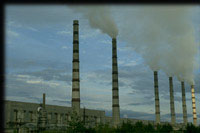 Does economic growth have to result in environmental degradation? For many years, pollution was accepted as the price paid for development. Now, however, as more and more people around the world become sick and our natural resources become too contaminated to be useful or enjoyed, we are realizing how steep that price really is. Pollutants that degrade our air, water, and soil make it harder for our environment to support life and long term development. The Bank is working with individual countries and international organizations to encourage development that keeps the needs of future generations in mind. One way of doing this is "integrated environmental management," which uses rewards and pressures to bring about responsible use of the environment.
Does economic growth have to result in environmental degradation? For many years, pollution was accepted as the price paid for development. Now, however, as more and more people around the world become sick and our natural resources become too contaminated to be useful or enjoyed, we are realizing how steep that price really is. Pollutants that degrade our air, water, and soil make it harder for our environment to support life and long term development. The Bank is working with individual countries and international organizations to encourage development that keeps the needs of future generations in mind. One way of doing this is "integrated environmental management," which uses rewards and pressures to bring about responsible use of the environment.
 Pollution Management
Pollution Management
This comprehensive site covers the Bank's ongoing work to find creative, effective ways to control environmental degradation that is both a by-product of and a hindrance to development. The site is organized according to type of pollution, the type of industry creating the pollution, and the region of the world affected. Many of the documents on this site look at the health impact of pollution. The following links may be particularly useful to you:
 More on Pollution Management
More on Pollution Management
 New Ideas in Pollution Regulation (NIPR)
New Ideas in Pollution Regulation (NIPR)
This dynamic site is for citizens, researchers, and government officials interested in understanding and improving control of industrial pollution, especially in developing countries. It is designed to invite feedback and participation from visitors. Not everything you find on this site reflects Bank policy; instead, this is a place where ideas are tried out and research is presented. You may find these links particularly useful:
 Ozone Depletion
Ozone Depletion
 Pollution and Health
Pollution and Health
Cities and Health: Air and Water Pollution
Air and water pollution isn't just unpleasant; in the world's major cities it causes tens of thousands of premature deaths, millions of cases of illness, and billions of dollars in lost productivity and other damage per year. Read this Environment Matters article to learn more about these problems and what is being done to combat them.
Valuing the Health Effects of Air Pollution
Everyone knows that air pollution is bad for your health, but how serious a threat is it? This paper gives insight into how policy makers make priorities when facing public health issues and presents a case for placing the environment near the top of the list.
World Bank Recommends Global Phase-Out of Leaded Gasoline
This news release explains that most of the 1.7 billion urban dwellers in developing countries are now at risk from lead poisoning--with 15 to 18 million children likely to suffer permanent brain damage--and describes the World Bank's efforts to encourage a worldwide phase-out of leaded gasoline.
 Explore these pages from World Development Indicators, 1999 to find data on poverty for over 140 of the world's countries.
To view these pages you will need Adobe Acrobat Reader. If you do not have it, you may download it
here for free.
Explore these pages from World Development Indicators, 1999 to find data on poverty for over 140 of the world's countries.
To view these pages you will need Adobe Acrobat Reader. If you do not have it, you may download it
here for free.
Water Pollution
Air Pollution
Energy Efficiency and Emissions
| Digging Deeper |
 |
 Tackling the Issues
Tackling the Issues
Pollution is associated with other issues that in their turn either reduce or increase pollution. Explore issues
like,
Urbanization,
Water and Sanitation,
Energy, and
Climate Change.


 Does economic growth have to result in environmental degradation? For many years, pollution was accepted as the price paid for development. Now, however, as more and more people around the world become sick and our natural resources become too contaminated to be useful or enjoyed, we are realizing how steep that price really is. Pollutants that degrade our air, water, and soil make it harder for our environment to support life and long term development. The Bank is working with individual countries and international organizations to encourage development that keeps the needs of future generations in mind. One way of doing this is "integrated environmental management," which uses rewards and pressures to bring about responsible use of the environment.
Does economic growth have to result in environmental degradation? For many years, pollution was accepted as the price paid for development. Now, however, as more and more people around the world become sick and our natural resources become too contaminated to be useful or enjoyed, we are realizing how steep that price really is. Pollutants that degrade our air, water, and soil make it harder for our environment to support life and long term development. The Bank is working with individual countries and international organizations to encourage development that keeps the needs of future generations in mind. One way of doing this is "integrated environmental management," which uses rewards and pressures to bring about responsible use of the environment.